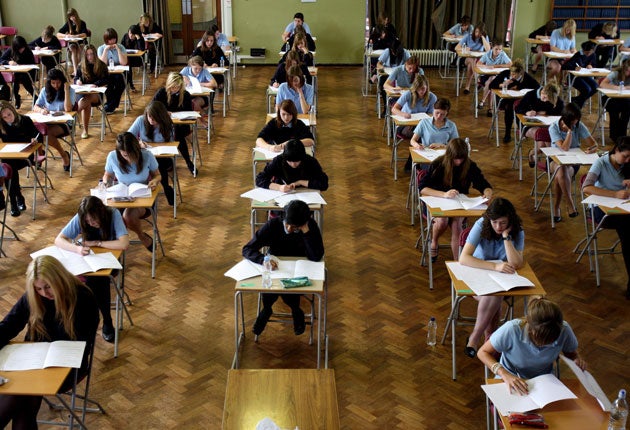Overseas students are better at English than the British
Home undergraduates make three times as many grammatical, punctuation and spelling mistakes

Your support helps us to tell the story
From reproductive rights to climate change to Big Tech, The Independent is on the ground when the story is developing. Whether it's investigating the financials of Elon Musk's pro-Trump PAC or producing our latest documentary, 'The A Word', which shines a light on the American women fighting for reproductive rights, we know how important it is to parse out the facts from the messaging.
At such a critical moment in US history, we need reporters on the ground. Your donation allows us to keep sending journalists to speak to both sides of the story.
The Independent is trusted by Americans across the entire political spectrum. And unlike many other quality news outlets, we choose not to lock Americans out of our reporting and analysis with paywalls. We believe quality journalism should be available to everyone, paid for by those who can afford it.
Your support makes all the difference.British undergraduates are nearly three times more likely to make errors in English than those from overseas, according to new research.
A study of written work produced by final-year students revealed that, on average, they had 52.2 punctuation, grammatical and spelling errors per paper compared with just 18.8 for the international students.
The research is disclosed today by Professor Bernard Lamb, reader in genetics at Imperial College London, and president of the Queen's English Society, after studying the written work produced in the year by his students. It will be published in the society's journal, Quest, next month.
Spelling errors included "flourescence" for "fluorescence", "alot" for "a lot", "seperate" for "separate", "yeild" for "yield", "relevent" for "relevant", "introduications" for "introductions" and "pail vains" for "pale veins".
"There were hundreds of cases of disagreement in number between subjects and verbs (such as 'male sterility are useful', 'fertility in most breeds have low heritability')," added the research. Wrong plurals – such as varietys, two theorys and the two hypothesis – were common, it added.
Grammatical errors included "done by my partner and I" and "a women".
On punctuation, it added: "Semicolons were often used to introduce lists. Very few students used colons.
"Some never used possessive apostrophes, and there were many apostrophes used in non-possessive plurals – 'the cows rectum' and 'the harem's of seals'.
"There were incomplete sentences, lacking a finite verb or a main clause. Illogical or ambiguous statements were frequent – (such as 'Barr bodies can be used to determine sex (present in females but not in males))', 'pass their X chromosome to half their son' and 'these colonies are then cross with another yeast strain'."
The Queen's English Society blames the errors on a "widespread deterioration in standards" when it comes to promoting the English language in schools.
"We need to raise the very poor standards of English of the home students by more demanding syllabuses and exams, more explicit teaching and examining of English (including grammar, spelling and punctuation) and by consistent correction of errors by teachers of all subjects," Professor Lamb said.
In his article, he adds: "I conclude that many of our schools do a poor job of motivating their pupils to take English standards seriously and are not teaching basic topics such as grammar, spelling and punctuation effectively. Above all, they are not correcting errors. One of my final-year home students told me that I was the only lecturer ever to have corrected her English and that she was grateful for it, unlike some others. We need constructive criticism and correction from primary school onwards. We need to tell the country that good English matters."
The survey covered 28 final-year undergraduates' work – 18 of them British and 10 from overseas (five Singaporeans, four Chinese and one Indonesian). Two-thirds of the home students made more errors than the worst overseas student.
The Queen's English Society was founded in 1972 with the aim of encouraging high standards of education in English, promoting English and knowledge, understanding and enjoyment of the language. It monitors and tries to improve standards of English in the media as well as in schools and says that it will "defend the precision, subtlety and marvellous richness of our language against debasement, unintended ambiguity and lack of clarity".
Join our commenting forum
Join thought-provoking conversations, follow other Independent readers and see their replies
Comments